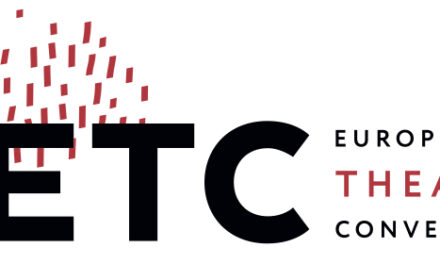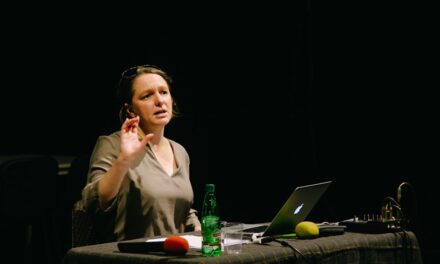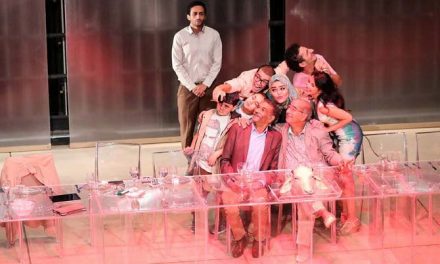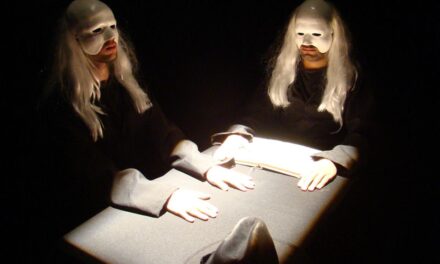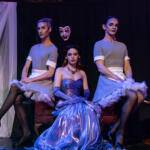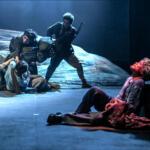Artistic practice, which allows for the creation and re-creation of social spaces as testing grounds for shaping communities, is an important means of socio-cultural expression, participation, and dialogue. In line with this idea, “acting as social practice” captures the essence of my artistic work and socio-political and educational concerns. With my fictional character, the stereotypical Arab man, “Ahmad Al Ahmad,” I have been advocating intercultural dialogue, diversity, and participation since 2019. As an “intercultural sensitizer,” I encourage different audience groups to push the boundaries of acceptance for themselves and others and to question prejudices – always embedded in an immersive comedy program.
Background
In Germany, identity has long played a central role in the immigration debate. The construction of concepts for a German identity is taking place under concrete historical-social conditions, impacting migrants’ experiences in Germany strongly as they are often the object of the debate rather than being perceived as agents in their own right. As long as these conditions are excluded from reflection, they will continue to affect migrant communities adversely.
The political term ‘Leitkultur,’ which can be translated as guiding or leading culture, repeatedly proves particularly problematic. Originally conceptualized to envision a core set of (Western) values that a community can agree upon in a dynamic consensus, the term has come to encompass static norms and traditions considered fundamental to a society’s identity. This concept is used as a ‘combat term’ in relation to integration, immigration, and national identity, especially concerning cultural values constructed as static and exclusive norms that newcomers should adopt or assimilate into when living in Germany. Leitkultur is typically decided by the majority white society and involves distinct elements of “othering” of communities with diverging backgrounds.
With statistics showing that today, almost 23 of 81 million people in Germany have experienced migration or have migration stories, the concept of a supposedly static German national identity is not only challenged but cannot be upheld. “New Germans” are increasingly making themselves heard and are at the forefront of shaping an inclusive, hyperdiverse, and dynamic new identity. This, in turn, is highly contested not only in right wing but also in mainstream conservative political discourse, and the process is far from completed. Unlike the United States, Germany is still struggling to come to terms with the reality of being a de facto immigrant society.
The Role of Theater
In my theatrical practice, I use the concept of Leitkultur and its implications as a basis for my interventions.
As shown before, political discourse in Germany does not run without friction and conflicts, causing a cultural shock among Germans who feel disoriented and helpless when exposed to what they perceive as foreign or alien. This culture shock is assumed to lead to loss of identity – a scenario that is more threatening for people with migration experience, but – provocatively or positively speaking – at the same time potential ground for dialogue where interrelated fears can be addressed on eye level.
Ahmad’s Role and ImpactIn my one-person show, Ahmad al Ahmad – The Show, I aim to emphasize that intercultural communication requires individuals to be aware of their own ideas and understanding of identity. This awareness affects their everyday practices, encounters, and interactions, as well as political debates. In modern societies, people belong to many different “subworlds.” Increased mobility has reduced the importance of the regional-spatial principle, leading to new, potentially enriching, but possibly threatening cultural experiences and a longing for home or feeling of loss. This is where the concept of a static or essential identity substituting older, multilayered spatial or social systems of belonging draws its virulence from.
In my theater work, I seek to question traditional standards used to decide who belongs in Germany, emphasizing citizenship rather than (essentialist) cultural factors or regional continuity. By prioritizing legal principles, I hope to provide a more transparent and fair understanding of German identity and inclusion in a society where many “Arabs” or “Turks” and others have long become citizens.
I want to emphasize the importance of recognizing the diverse reality of migrants and people with migrant history in Germany today. It’s essential to address the challenges faced by German society in relation to social and international developments, including globalization and Germany’s role as a destination for migrants. Rather than framing resulting challenges as specific migrant problems, it’s important to acknowledge that all individuals who are unwilling to confront their own insecurities and concerns about perceived “others” or “aliens” may feel threatened and may develop negative stereotypes about perceived adversaries, while the most pressing challenges are global and can only be addressed together.
Engaging the Audience
In my practice, I emphasize that the integration and self-realization of migrants cannot be achieved solely through political demands or within the private sphere. Instead, it requires a collective effort and eye-level dialogue within society, where diverse voices are heard and attributed with agency. Ahmad, in the show, engages with all elements of his “Arab” identity in interaction with members of the surrounding “German” society, leading to comic effects. Ahmad’s true power lies in his realization of helplessness to affect larger societal structures, transferring the tension to the spectators of the host society and opening new spaces of dialogue and understanding by questioning established perspectives and shifting assumptions.
A Pedagogical Approach
In terms of Augusto Boal’s concept of the Theater of the Oppressed, my approach is a pedagogical practice with political intentions. Ahmad faces European forms of suppression, such as loneliness and the inability to communicate with others. He works with methods of intercultural communication originally designed for intercultural training in the business world. This includes understanding cultural identity, verbal and non-verbal communication, values and norms, status, the difference between pity and respect, and power sharing.
My theatrical interventions aim to create a space outside dualistic models to categorize individuals as either “us” or “aliens” in the ongoing migration debate in Germany, by opening the path to what I call, a third culture. This space gathers both ends of the spectrum: the receiving society and people with migrant stories. By combining artistic input and theater’s pedagogical approaches, I aim to broaden perspectives, open spaces for new experiences, and build bridges. My show does not stop at telling a story of migration and the experiences Ahmad had as a refugee. On a deeper level, it attempts to create a space where culture can be shared and adapted. I achieve this by engaging the public through a range of immersive elements during the show, sometimes irritating and sometimes aimed at making rarely heard voices audible but always within a safe space moderated softly by the outwardly humble or naive figure of Ahmad.
The processing of difficult topics and dealing with societal challenges benefits additionally from the combination of stage comedy with additional formats ranging from politically framed panel discussions to workshops that take up questions brought up during the show. Social media platforms such as Facebook, Instagram, and YouTube provide further means of reaching a wider audience and sharing my findings and ideas about inclusion and anti-discrimination. They allow for a broad engagement, where Ahmad facilitates discussions with the humoristic, soft touch unique to his character. The generated content is still archived on various platforms and serves as a digital memory of a specific period.
In my workshops, I utilize theater pedagogical methods to make theoretical concepts tangible for the participants and give them a means of trying different roles and positions, reflecting their beliefs, and providing them with new options for social interaction. The combination of artistic input and theatre pedagogy makes it possible to finely tune irritations, broaden perspectives, welcome new experiences, and build bridges. Discussions of trauma, forced migration, and the empowerment of marginalized groups and individuals are integral. With my show as well as a broader framework of formats built around the same topics, I aim to foster a deeper understanding of cultural diversity, promote intercultural communication, and contribute to an inclusive society that embraces its factual hyper-diversity and comes to see it as a resource to tackle the big challenges of today.
This post was written by the author in their personal capacity.The opinions expressed in this article are the author’s own and do not reflect the view of The Theatre Times, their staff or collaborators.



